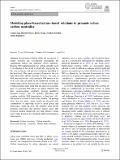Modeling place-based nature-based solutions to promote urban carbon neutrality
Author(s)
Cong, Cong; Pan, Haozhi; Page, Jessica; Barthel, Stephan; Kalantari, Zahra
Download13280_2023_Article_1872.pdf (1.869Mb)
Publisher with Creative Commons License
Publisher with Creative Commons License
Creative Commons Attribution
Terms of use
Metadata
Show full item recordAbstract
Abstract
Nature-based solutions (NbS) are recognized as widely available and cost-effective mechanisms for sequestering carbon and offsetting carbon emissions. Realistic NbS implementations for carbon neutrality need to be effective at the global level and also appropriate for the socio-economic and physical conditions prevailing at the local level. This paper presents a framework that can help stakeholders identify demands, locations, and types of NbS interventions that could maximize NbS benefits at the local scale. Key processes in the framework include (1) interpolating carbon emissions data at larger spatial scales to high-resolution cells, using land use and socio-economic data; (2) assessing NbS effects on carbon reduction and their location-related suitability, through qualitative literature review, and (3) spatially allocating and coupling multiple NbS interventions to land use cells. The system was tested in Stockholm, Sweden. The findings show that the urban center should be allocated with combinations of improving access to green spaces and streetscapes, while the rural and suburban areas should prioritize preserving and utilizing natural areas. Our proposed method framework can help planners better select target locations for intended risk/hazard-mitigating interventions.
Date issued
2023-05-15Department
Massachusetts Institute of Technology. Department of Urban Studies and PlanningPublisher
Springer Netherlands
Citation
Cong, Cong, Pan, Haozhi, Page, Jessica, Barthel, Stephan and Kalantari, Zahra. 2023. "Modeling place-based nature-based solutions to promote urban carbon neutrality."
Version: Final published version